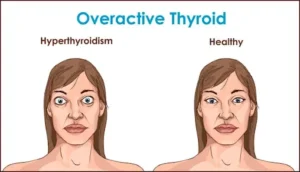The thyroid gland is often described as the body’s engine, driving metabolism, energy production, and many other critical functions. Despite its small size, it plays a central role in maintaining overall health. When the delicate balance of thyroid hormones is disrupted, it can lead to conditions like hypothyroidism, where the thyroid is underactive, or hyperthyroidism, where it becomes overactive. By understanding these conditions, their causes, symptoms, and treatment options, you can manage both hypothyroidism and hyperthyroidism effectively.

Understanding the Thyroid Gland
The thyroid gland is a butterfly-shaped organ located at the front of the neck, just below the Adam’s apple. It’s a small but powerful part of the endocrine system, responsible for producing hormones that regulate almost every aspect of metabolism.
The two primary hormones produced by the thyroid are triiodothyronine (T3) and thyroxine (T4). These hormones influence everything from how your body uses energy to how it maintains temperature, supports brain function, and even regulates heart rate. The production of T3 and T4 is tightly controlled by the pituitary gland through a hormone called thyroid-stimulating hormone (TSH).
When T3 and T4 levels are low, TSH levels rise to stimulate the thyroid to produce more hormones, and when T3 and T4 levels are high, TSH production decreases. This feedback loop keeps your metabolism running smoothly until something goes wrong.
What is Hypothyroidism?
Hypothyroidism occurs when the thyroid fails to produce sufficient amounts of hormones, causing the body’s metabolic processes to slow down. It’s one of the most common thyroid disorders and can affect individuals of all ages, though it is more prevalent in women and older adults.
Causes of Hypothyroidism
The most common cause of hypothyroidism is Hashimoto’s thyroiditis, an autoimmune condition where the immune system attacks and damages the thyroid gland. Other causes include iodine deficiency or, conversely, excessive iodine intake, which can disrupt hormone production. Furthermore, certain medications, such as lithium or amiodarone, may interfere with thyroid function, and treatments like thyroid surgery or radiation therapy can also lead to reduced hormone production.
Symptoms of Hypothyroidism
Symptoms of hypothyroidism develop gradually and can often be mistaken for signs of aging or stress. Common symptoms include persistent fatigue, unexplained weight gain, and a heightened sensitivity to cold. Physical changes like dry skin, hair thinning, and brittle nails are also prevalent. Many individuals with hypothyroidism experience digestive issues such as constipation and mental health challenges like depression, slowed thinking, or difficulty concentrating. Left untreated, these symptoms can escalate and severely impact quality of life.
Health Risks of Untreated Hypothyroidism
Ignoring hypothyroidism can lead to severe complications. The thyroid gland may enlarge to compensate for reduced hormone production, causing a goiter. Women with untreated hypothyroidism may face fertility issues or irregular menstrual cycles. In rare cases, hypothyroidism can lead to myxedema, a life-threatening condition marked by extreme fatigue, low body temperature, and swelling.
What is Hyperthyroidism?
In contrast to hypothyroidism, hyperthyroidism is characterized by the overproduction of thyroid hormones, resulting in an accelerated metabolism. This condition can have widespread effects on the body, often causing a mix of physical, emotional, and cognitive symptoms.

Causes of Hyperthyroidism
The most common cause of hyperthyroidism is Graves’ disease, an autoimmune disorder where the immune system overstimulates the thyroid. Another contributing factor is the presence of thyroid nodules, which are lumps in the gland that produce excessive hormones. Overconsumption of iodine, whether through diet or supplements, can also trigger hyperthyroidism.
Symptoms of Hyperthyroidism
Individuals with hyperthyroidism often notice unexplained weight loss despite maintaining or even increasing their appetite. Other hallmark symptoms include a rapid or irregular heartbeat, tremors, and an inability to tolerate heat. Many people also experience heightened anxiety, irritability, and difficulty sleeping. Physical changes like excessive sweating and frequent bowel movements may occur, alongside a persistent feeling of restlessness.
Health Risks of Untreated Hyperthyroidism
If left unmanaged, hyperthyroidism can lead to serious complications. Prolonged overactivity of the thyroid can weaken bones, increasing the risk of osteoporosis. The heart may also suffer, with conditions like atrial fibrillation or heart failure becoming a concern. A rare but severe complication called a thyroid storm can occur, involving a sudden and extreme worsening of symptoms that requires immediate medical attention.
Diagnosing Thyroid Disorders
Diagnosing thyroid disorders often begins with a thorough medical history and physical examination. Blood tests are crucial in confirming the diagnosis. Measuring TSH levels helps identify whether the thyroid is overactive or underactive, while tests for free T3 and free T4 provide more detailed information about hormone production. In cases where autoimmune conditions are suspected, antibody tests like TPOAb (thyroid peroxidase antibodies) or TRAb (TSH receptor antibodies) may be performed.
For structural concerns, imaging studies such as ultrasounds can reveal the presence of nodules, cysts, or other abnormalities. In some cases, a radioactive iodine uptake test may be conducted to evaluate how the thyroid processes iodine, shedding light on the underlying cause of hyperthyroidism.
Treatment Options for Hypothyroidism
The cornerstone of hypothyroidism treatment is hormone replacement therapy. The most commonly prescribed medication is levothyroxine, a synthetic form of T4 that restores hormone levels and alleviates symptoms. Treatment requires careful monitoring to ensure the correct dosage, as both under-treatment and over-treatment can lead to complications.
A supportive diet is also crucial. Including iodine-rich foods, such as seafood and iodized salt, helps support thyroid function, although excessive iodine should be avoided. Foods rich in selenium, like Brazil nuts and sunflower seeds, can enhance thyroid health. Regular exercise combats fatigue and weight gain, while stress management techniques like meditation or yoga help maintain hormonal balance.
Treatment Options for Hyperthyroidism
Hyperthyroidism treatments aim to reduce thyroid hormone levels or limit their effects. Medications like methimazole or propylthiouracil inhibit hormone production, while beta-blockers are often prescribed to manage symptoms like rapid heart rate and tremors.
For long-term solutions, radioactive iodine therapy is a common approach. This treatment destroys overactive thyroid cells, often resulting in hypothyroidism, which can then be managed with hormone replacement therapy. In cases where medication and iodine therapy are ineffective or unsuitable, surgery to remove part or all of the thyroid gland may be considered.
Dietary adjustments are also vital. Patients are advised to avoid foods high in iodine, such as kelp or iodized salt, and focus on nutrient-dense options to prevent deficiencies that could exacerbate symptoms.
Managing Thyroid Disorders Naturally
In addition to medical treatments, adopting a holistic approach can enhance thyroid health. A balanced diet, rich in protein, fiber, and healthy fats, supports overall metabolism. Gut health is another critical factor, with probiotics and prebiotics playing a role in reducing inflammation and supporting thyroid function. Stress-reduction techniques like yoga, deep breathing, or mindfulness exercises can also help stabilize hormonal imbalances.
Certain supplements, such as ashwagandha, zinc, and magnesium, may offer additional support for thyroid function, but these should always be taken under medical supervision to avoid potential interactions or adverse effects.
Monitoring and Long-Term Management
Effective management of thyroid disorders requires ongoing vigilance. Regular blood tests are essential to monitor hormone levels and assess the effectiveness of treatment. Dosages of medication may need adjustment over time, especially during life changes like pregnancy or aging.
Building a strong relationship with a healthcare provider is critical for long-term care. Open communication ensures that symptoms are addressed promptly and treatment plans are adjusted as needed.
Conclusion
Thyroid imbalances, whether from hypothyroidism or hyperthyroidism, can significantly affect every aspect of life. However, with early diagnosis, consistent treatment, and supportive lifestyle changes, individuals can manage these conditions effectively and lead healthy, fulfilling lives. If you suspect thyroid issues, consult a healthcare professional to get the care you need. Early intervention can make all the difference in restoring balance and vitality.
If you or your loved one are facing any of the above symptoms, you should see a doctor immediately. Visit Frontline Healthcare medical clinic today for a quick consultation.

